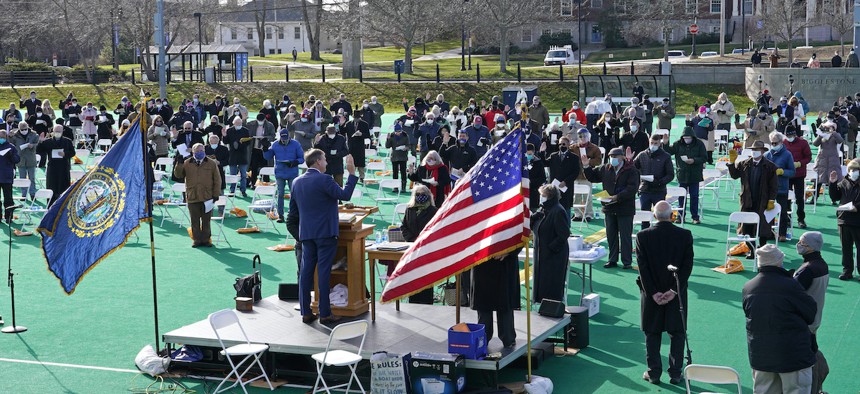As Coronavirus Continues, State Lawmakers Debate How to Meet Safely

New Hampshire Gov. Chris Sununu, at podium, swears in lawmakers during an outdoor session, Wednesday, Dec. 2, 2020, at the University of New Hampshire in Durham, N.H. Associated Press
Some state legislative bodies have convened outside, while others anticipate hybrid sessions of in-person and virtual hearings and votes. And at least some states will only be holding typical sessions, with adjustments.
Lawmakers in most states have yet to settle on the details of how to safely hold in-person legislative sessions during the coronavirus pandemic. But, for now, the majority seem committed to coming into sessions.
“Everyone is aware of Covid-19, and at this point, everyone knows family or friends or somebody who has had it or been impacted,” Idaho Rep. Scott Bedke, speaker of the state’s House of Representatives, said in a TV interview last month. “So I think everybody will take that into consideration. But it doesn’t diminish the fact we have a duty we must carry out.”
Across the country, lawmakers seem to agree. As of this week, just one legislature—the Illinois General Assembly—had opted to postpone, according to the National Conference of State Legislatures. That session, scheduled specifically to consider vetoes, was originally slated for Nov. 17-19 and Dec. 1-3, but was scrapped last month by lawmakers after coronavirus cases surged in the state.
“It is not safe or responsible to have a legislative session under these circumstances,” Senate President Don Harmon said at the time.
Many legislatures remain adjourned, though some have begun testing the waters of in-person meetings in the weeks since the general election. For example, last week in Maine, legislators took their oath of office at the Augusta Convention Center, seated apart at long tables. They later adopted an order allowing committees to meet and vote virtually, signaling that at least some of the upcoming session would take place electronically.
That same day in New Hampshire, newly elected lawmakers met for the first time outside in 40-degree weather, seated on socially distanced folding chairs atop green astroturf on a university athletic field.
The meeting, known as Organization Day, is when lawmakers meet to elect their leaders, the secretary of state and the state treasurer. It’s held on the first Wednesday of December in each election year, as required by the state’s constitution.
Despite the safety precautions and the long-held tradition, 130 representatives—most of them Democrats, whose party lost control of both legislative chambers after November’s election—skipped the ceremony over concerns about the virus, saying the in-person meeting was irresponsible against the backdrop of the surging pandemic.
At that meeting, Republicans changed House rules, eliminating mandatory sexual harassment training without sending the motion through a rules committee, the Associated Press reported. Democrats condemned the move, with Rep. Tim Smith saying Organization Day "has never been used as a vehicle for substantive rule changes.”
On Thursday, the difficult decisions lawmakers across the country have to make about Covid-19 came into sharp relief in New Hampshire with the announcement that Richard "Dick" Hinch, the newly elected House Speaker, died this week of Covid-19. “Speaker Hinch was a fierce defender of the New Hampshire Advantage, a close friend, and a respected public servant,” Gov. Chris Sununu said in a statement.
In other states, lawmakers remained in the planning stages. Legislators in Oklahoma had yet to arrive at specifics, while the Texas Legislature is considering mandating coronavirus testing for people who wish to testify at committee hearings.
In Oregon, Gov. Kate Brown was considering the enactment of a never-used provision in the state constitution that would allow her to call a “catastrophic” session, giving lawmakers the option to meet and vote remotely rather than setting foot in the capitol. In Washington, House Democrats were asked to limit their legislative priorities to seven bills each, and only those that are “urgently needed.”
“We recognize that each member has individual authority and responsibility for developing their legislative agenda, but we will need to hold each other accountable to these limits in order to focus our work on the critical needs of our state and to avoid untenable workloads for our legislative staff,” said the legislative guidance, sent to members of the House Democratic Caucus.
Other states had made more sweeping concrete decisions. Virginia’s House of Delegates will meet virtually in 2021, while the Wyoming State Legislature ruled out that possibility entirely.
And at least two legislatures shut down temporarily. In Arizona, lawmakers were forced to cancel meetings for a week after a handful of Republican legislators met—maskless—with Rudy Giuliani, President Donald Trump’s personal lawyer, who later tested positive for coronavirus. The legislature is expected to reopen on Monday.
Giuliani had also met with Republicans in Michigan, prompting the state’s House of Representatives to cancel three days of hearings this week. The state Occupational Health and Safety Administration is now investigating the legislative body for Covid-19 violations following an employee complaint, the Detroit Free Press reported.
Kate Elizabeth Queram is a staff correspondent for Route Fifty and is based in Washington, D.C.
NEXT STORY: Instead of Defunding Police, Minneapolis Cuts $8 Million from Department Budget





